Taking care of your pet’s oral hygiene is a crucial part of their overall health, yet many pet owners struggle with brushing their dog or cat’s teeth. Pets that dislike teeth brushing can become resistant, making the process stressful for both the pet and owner. This article explores six practical and effective tips to help you care for your furry friend’s teeth, even if they hate teeth brushing, while also addressing common questions and concerns about pet dental care.
Why Is Dental Care Important for Pets?
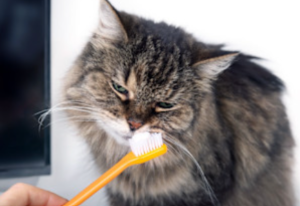
Dental hygiene is just as vital for pets as it is for humans. Poor oral health can lead to plaque buildup, bad breath, gum disease, and even more severe health problems like infections or organ damage. Regular dental care prevents these issues and ensures your pet leads a happy and healthy life.
If your pet hates teeth brushing, it’s essential to find alternative methods to maintain their oral health without compromising their comfort. Let’s dive into six tips that can make the process easier and more effective.
1. Start Small and Slow
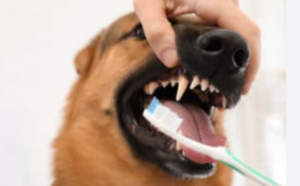
For pets that dislike brushing, starting small and gradually introducing the routine can make a significant difference.
How to Start:
- Introduce the Toothbrush: Begin by letting your pet sniff and interact with the toothbrush or finger brush without attempting to brush their teeth.
- Use Your Finger: Initially, use your finger wrapped in a clean cloth to gently rub their gums and teeth. This allows them to get accustomed to the sensation.
- Short Sessions: Keep the first few sessions short and rewarding, focusing on positive reinforcement.
Why It Works:
Gradual exposure reduces anxiety and helps your pet associate the toothbrush with positive experiences rather than fear or discomfort.
2. Choose the Right Tools
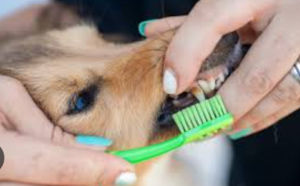
Selecting the appropriate tools for your pet’s dental care can make the process more comfortable and effective.
What You Need:
- Pet-Specific Toothbrushes: Use brushes designed for pets, such as finger brushes or soft-bristled brushes tailored to your pet’s size.
- Pet-Friendly Toothpaste: Never use human toothpaste, as it can be toxic to pets. Choose flavors like poultry, beef, or seafood to make the experience enjoyable.
Alternative Tools:
For pets that resist toothbrushes altogether, consider:
- Dental wipes
- Dental sprays
- Chew toys designed for oral hygiene
3. Make It a Positive Experience
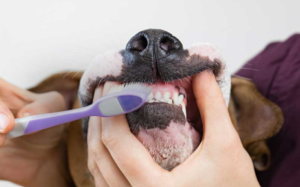
A positive association with teeth brushing can help alleviate your pet’s resistance over time.
How to Encourage Cooperation:
- Reward Good Behavior: Offer treats, praise, or playtime after each brushing session.
- Stay Calm: Use a gentle tone and avoid forcing your pet, as this can increase their anxiety.
- Practice Patience: It may take several weeks or months for your pet to fully accept teeth brushing as part of their routine.
Additional Tip:
Try brushing your pet’s teeth at a consistent time each day, such as after meals or before bedtime, to establish a predictable routine.
4. Explore Dental Chews and Toys
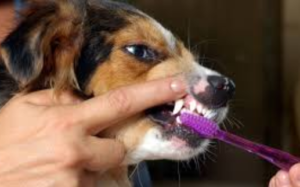
If your pet absolutely refuses teeth brushing, dental chews and toys can provide an alternative way to maintain oral health.
Benefits of Dental Chews and Toys:
- Plaque Removal: Chewing helps reduce plaque buildup and massages the gums.
- Entertainment: These products keep your pet engaged while promoting dental health.
Popular Options:
- Rubber chew toys with ridges
- Rawhide alternatives
- Dental sticks infused with enzymes
Important Note:
Always supervise your pet while they’re using chews or toys to prevent choking or ingestion of large pieces.
5. Incorporate Dental Diets and Water Additives
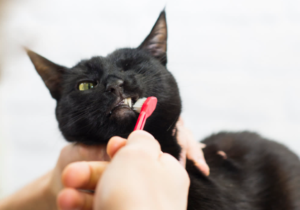
For pets that are resistant to physical cleaning methods, diet and water additives can support oral hygiene.
Dental Diets:
- Specially formulated kibble helps scrape plaque off teeth during chewing.
- Consult your vet for recommendations on dental diets tailored to your pet’s needs.
Water Additives:
- Add pet-safe dental rinses or additives to your pet’s water bowl to reduce bacteria and freshen breath.
- Ensure the additive is approved by veterinarians and suitable for daily use.
6. Regular Professional Dental Check-Ups
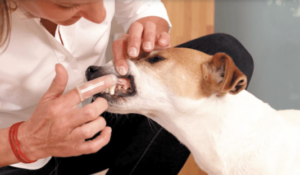
Even with diligent at-home care, professional dental check-ups are essential for maintaining your pet’s oral health.
Why Professional Care Matters:
- Thorough Cleaning: Vets can remove tartar and plaque buildup that home care may miss.
- Early Detection: Regular exams help identify dental issues like infections, broken teeth, or gum disease before they escalate.
Frequency of Visits:
Schedule dental check-ups at least once a year or as recommended by your veterinarian. For pets with ongoing dental issues, more frequent visits may be necessary.
Frequently Asked Questions (FAQs)
What if My Pet Hates All Forms of Dental Care?
If your pet resists all methods, prioritize professional dental care and explore options like dental diets and water additives. Consult your vet for personalized advice.
Are Dental Chews Enough to Replace Brushing?
While dental chews can help, they’re not a substitute for brushing. Combining chews with other methods provides the best results.
How Can I Tell If My Pet Has Dental Problems?
Look for signs like bad breath, swollen gums, difficulty eating, or excessive drooling. If you notice these symptoms, visit your vet immediately.
Final Thoughts
Caring for your pet’s teeth doesn’t have to be a struggle. By using a combination of the tips above and staying patient, you can ensure your furry companion enjoys a healthy smile for years to come. Remember, consistency is key, and even small steps can make a big difference in your pet’s oral health.
Always consult your veterinarian for personalized advice and recommendations to suit your pet’s specific needs. With time and effort, you’ll find the perfect dental care routine that keeps both you and your pet happy.
